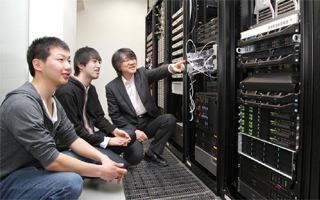- HOME
- DEPARTMENTS
- Graduate School
- Division of Frontier Informatics
Division of Frontier Informatics
Fostering Engineers/Researchers Initiating Challenges toward Information Science Frontiers

Learned knowledge gets quickly outdated as the field of Information Technology is rapidly advancing. In this field, applying the knowledge does matter. The Division fosters committed professionals undertaking challenges with curiosity in emerging new developments. Actively working together with faculty members, students will acquire advanced applied research and development ability. The Division offers genuine attraction to engage in a new field where nobody knows unless one does try out.
Frontier Informatics Course Graduate Program Description
Learning the frontier field of Information
Our main three research fields include (1) science and technology that support advanced information society, (2) information network in a globalized world, and (3) communication between humans and IT environments. Our faculty members undertake these frontier fields in Information Science and also leading-edge research in a variety of fields. As we work on the frontier fields, our graduate students have equal opportunities in research and development. The faculty members and our graduate students’ research are well recognized with many awards (see TOPICS).
High-Quality Experiment and Research Facility
The Division is well equipped with high performance Web servers, cutting-edge computers, living laboratory, BMI experiment laboratory, electroencephalogram experiment room, audiovisual perception experiments laboratory, and media studios. We have two terabyte-computer servers and internet backbones across our office building floors of 10 gigabit-per-second. We conduct a wide range of computer technology and neuroscience research in our one-campus University setting.
Wide range of research fields from Computer’s Fundamental Technology to Neuroscience
We conduct a wide range of research on fundamental and applied technology such as hardware, software, and networks, and ways in which these technologies affect humans. For example, some of our research includes (1) Kansei engineering, research on human sensibility and emotions, (2) Individually Adapted Web application, (3) User-friendly systems, and (4) interfaces between brain and information devices. These works involve cross-cutting interdisciplinary approach, such as neuroscience and psychology. Our living laboratory, “Home (ΞHome)” explores near future housings.





